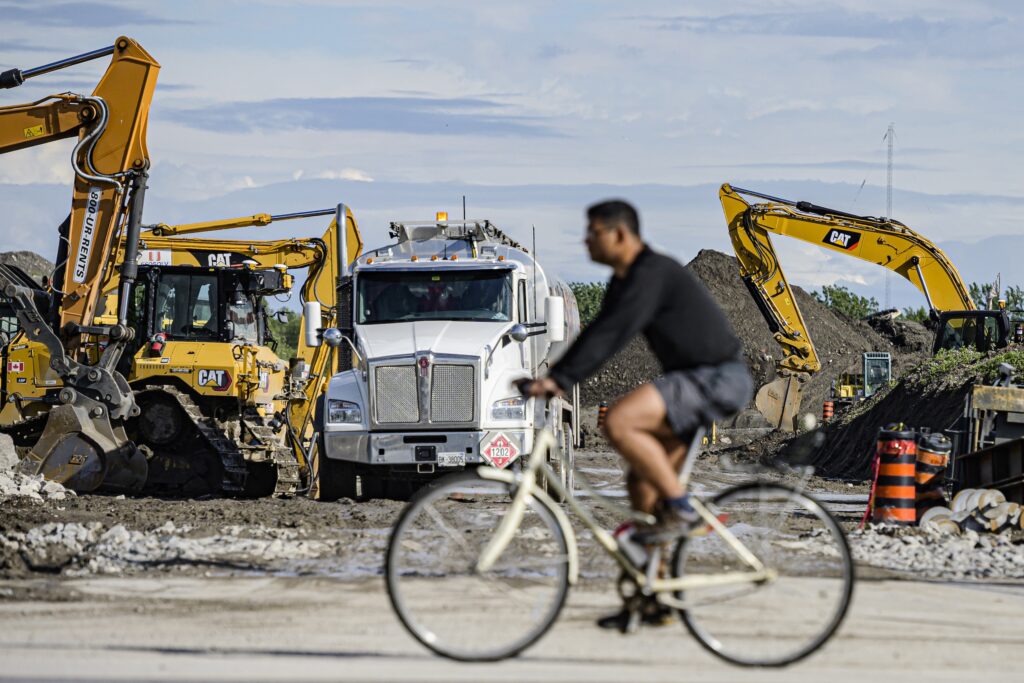Infra
Ontario developers sue Toronto over green building standards | The Narwhal

Get the inside scoop on The Narwhal’s environment and climate reporting by signing up for our free newsletter.
Ontario developers have launched a legal challenge against the City of Toronto, questioning its authority to impose construction “green standards”— rules to ensure new buildings are energy efficient, minimize emissions and accomodate pedestrians and bikes.
The Residential Construction Council of Ontario — a non-profit industry association representing residential builders — filed the challenge at the Ontario Superior Court on Nov. 19. In it, the association argues the City of Toronto is overstepping its powers by enacting rules over “the manner of construction and construction standards.”
The association is asking the provincial court to prohibit the city from imposing those standards and any others in the future that would dictate construction requirements beyond the Ontario building code. Close to 30 municipalities have instituted such standards in recent years, as the Doug Ford government has delayed introducing them provincially in its push to speed up housing development.
Richard Lyall, president of the Residential Construction Council of Canada, told The Narwhal the green standards are making building housing “more complicated” at a time when the province is facing a housing shortage.
“This [legal challenge] was a last resort,” he said in an interview. “We’re pro-green buildings but let’s have a common set of standards. We don’t need each municipality cooking their own system and forcing builders to follow it.”
“It’s frustrating, believe me,” he added. “We don’t want to do this. We don’t want to take the City of Toronto to court and get a judgment, but we feel we don’t have an alternative and things are getting crazy enough.”
In an emailed statement to The Narwhal, the City of Toronto said it would respond to the legal challenge “in due course,” adding the Toronto Green Standard is updated every four years, with the next update scheduled for next fall.
Two sources familiar with the matter but unauthorized to speak about it publicly told The Narwhal the lawsuit took city and industry officials by surprise.
The sources said representatives of the construction council and city officials have been in “semi-regular conversations” about the next iteration of the Toronto Green Standards for the past several months, which the sources characterized as “productive.” In addition to creating climate-specific requirements for all new developments in the city, the current standards offer financial incentives to developers to encourage energy efficient, low emissions buildings.
Buildings are the third largest source of carbon emissions in Ontario, with heating, cooling and other daily functions accounting for 24 per cent of the province’s total emissions. In 2020, the province’s auditor general found the government wasn’t doing enough to address building emissions, noting various ministries “do not … effectively oversee, evaluate and improve the performance of programs to support and encourage reducing energy use in buildings.”
Lyall described the auditor general’s findings as “an argument without any basis in fact,” saying he “did not agree.” In his opinion, Ontario’s building code is “one of the greenest in the country.”
Many cities had a different response. Since the auditor general’s report, Toronto and close to 30 municipalities — including Ottawa, Brampton, Ajax, Whitby, Pickering, Halton Hills, Markham, Richmond Hill, and most recently, Mississauga, Brampton and Caledon — have filled the provincial gap by instituting city-specific rules for climate-resilient construction that go beyond Ontario’s building code.
Over the years, developers have pushed back against these rules, which they argue increase construction costs at a time when the province desperately needs more housing. The tensions came to a head in April when the Residential Construction Council of Ontario threatened legal action, questioning whether cities have the legislative authority to create municipal conditions for building permit approvals.
That threat seemed idle — until now. Conversations between the construction council and the City of Toronto “seemed fine,” one of two sources who spoke to The Narwhal about the issue said. “There appeared to be progress,” the second source said. Both said the council didn’t express specific concerns about the Toronto Green Standards, just general worries about the challenging environment they work in, and the need to be able to build without red tape.
The lawsuit came “out of nowhere,” both sources told The Narwhal.
Lyall said the conversations have been “frustrating” for the council because of a “difference in the realities.” He said developers face a series of challenges — including rising development charges, taxation and construction costs — that make it difficult to build housing. Green standards add to that burden by specifying mandatory building materials and moving heating and cooling systems away from natural gas and towards electricity, he said.
“The biggest problem is we are falling off a cliff,” he said. “This [legal challenge] is just one of many things we’re trying to address.”
The lawsuit is the latest attack on municipal green standards. In 2022, the Doug Ford government tried to remove city authority to impose green standards, saying it would help speed up the construction of homes. The government reversed this move after pushback from city staff. At the time, a group of 50 engineers said green standards have “been successful in reducing greenhouse gas emissions and stormwater runoff from new buildings, as well as reducing the urban heat island effect” — the term for how concrete and asphalt trap heat, which can be offset by natural features like trees, water and unpaved areas.
The two sources told The Narwhal the developer association’s lawsuit could have a chilling effect on local climate action, making Ontario cities hesitant to propose new green standards or strengthen existing ones.
If successful, the lawsuit “will set us back in our ability to address climate change in Ontario cities,” one source said. “If Toronto Green Standards go, they all go.”









